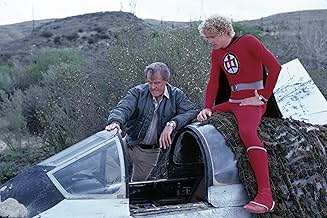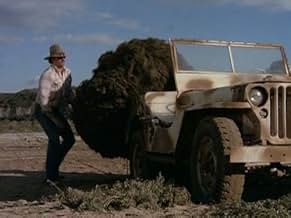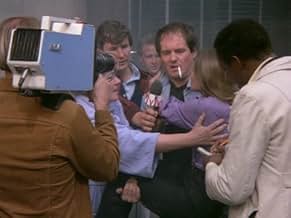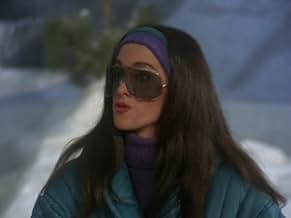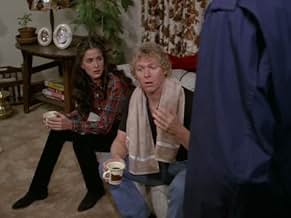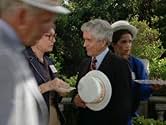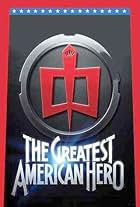A teacher is asked to be a superhero using a special alien suit with powers he can barely understand or control.A teacher is asked to be a superhero using a special alien suit with powers he can barely understand or control.A teacher is asked to be a superhero using a special alien suit with powers he can barely understand or control.
- Nominated for 4 Primetime Emmys
- 1 win & 8 nominations total
Browse episodes
Featured reviews
`The Greatest American Hero' is a textbook case of a television show being a victim of `the powers that be.' I was in grade school during the time of its run, but I remember most of the behind the scenes drama. Though its initial debut was well received, it wasn't long before the show met an ill-fated course. First, it was an unfortunate victim of the 1981 Reagan assassination attempt, resulting in the horrific `Hinkley/Hanley' overdub. This event, followed by constant time changes, late season debuts, pre-empts, and the never-ending lawsuit with Warner Brothers and DC comics over its supposed `Superman-like' premise, kept it from reaching its full potential with viewers. Then, like those aliens in the desert, the show disappeared without a trace.
There are several theories as to why this show never reached its full potential. I personally think Warner Brothers and DC Comics made ABC executives nervous, hence the delays and time changes. While I can certainly understand their motives (the Superman movies were popular at the time) I considered each character to be a separate entity. I never thought William Katt was an exact clone of Christopher (or George, for that matter) Reeve's famous role. Superman (I thought) was a strong, supernatural hero from another planet who masqueraded as a human being. The Greatest American Hero was just an ordinary guy who stumbled upon good fortune and tried to utilize it in the best way he could to help mankind. It could have been anyone that night instead of Ralph Hinkley, for all we know (the lyrics of the theme song attempted to explain this). Katt simply provided a handsome, lovable example of the `imperfect hero.'
My mother and sister absolutely loved this show. I was the youngest, so I watched it mostly because they did! `The Greatest American Hero' did grow on me, though so I, too, have fond memories. I was in love with the theme song, however, from the debut! Even if you didn't like the show, you have to admit that the theme song, `Believe It Or Not,' sung by Joey Scarbury, is one of the greatest of all time. The earlier comments were correct. `Believe It Or Not' is awesome.
Absolutely awesome!
There are several theories as to why this show never reached its full potential. I personally think Warner Brothers and DC Comics made ABC executives nervous, hence the delays and time changes. While I can certainly understand their motives (the Superman movies were popular at the time) I considered each character to be a separate entity. I never thought William Katt was an exact clone of Christopher (or George, for that matter) Reeve's famous role. Superman (I thought) was a strong, supernatural hero from another planet who masqueraded as a human being. The Greatest American Hero was just an ordinary guy who stumbled upon good fortune and tried to utilize it in the best way he could to help mankind. It could have been anyone that night instead of Ralph Hinkley, for all we know (the lyrics of the theme song attempted to explain this). Katt simply provided a handsome, lovable example of the `imperfect hero.'
My mother and sister absolutely loved this show. I was the youngest, so I watched it mostly because they did! `The Greatest American Hero' did grow on me, though so I, too, have fond memories. I was in love with the theme song, however, from the debut! Even if you didn't like the show, you have to admit that the theme song, `Believe It Or Not,' sung by Joey Scarbury, is one of the greatest of all time. The earlier comments were correct. `Believe It Or Not' is awesome.
Absolutely awesome!
This show did a great deal of changing over it's three year run. Starting as a spring replacement show, it starred relative newcomer William Katt as the tragically named Ralph Hinckley (I'll get to the tragedy in a minute), a high school teacher with lots of troubled kids in his class. Hinckley is in the middle of a custody suit with his exwife, and is falling in love with his lawyer, Pam Davidson (Connie Sellecca).
Things are looking OK for Hinckley until one night, in the California desert, he encounters aliens who give him a suit that endows upon him superpowers when he wears it. Then he loses the instruction manual. Nothing can throw a monkey wrench into your divorce/custody/employment plans like running around in what looks like red footie pajamas with a cape claiming you are saving the day. Ralph is instructed by the aliens to work with FBI agent Bill Maxwell (Robert Kulp), and this part is easy because Maxwell is there when the aliens give them the suit in the person of his recently deceased partner, who is going with the aliens but gives Bill the "live long and prosper" hand movement through the car glass window a full year before "The Wrath of Khan". Hmmmmmmm.
Thus Bill and Ralph form this sort of good cop/bad cop duo, except Ralph is no cop. Bill is the formal law and order type. Ralph is the give peace a chance type. For all of his super powers, Ralph didn't seem to notice that his son, who brought him and Pam together in the first place, disappears after four episodes, never to be mentioned again. Maybe this invisibility was inherited from the ex-wife, because we never see or hear about her again either.
The tragic naming of our protagonist that I mentioned? Well 12 days after this show debuted President Reagan was shot by John Hinckley. In a typical case of overreacting, the show had Ralph renamed "Hanley" or "Mr. H" for the rest of the first season, as though just being named Hinckley somehow made you an untouchable. Then, he magically went back to Ralph "Hinckley" at the beginning of the second season.
As for the "bad kids" in Ralph's class, among them there was Michael Pare in his first role, and apparently a role that got him noticed because he was making movies at a pretty frenetic pace for the rest of the 1980's, though he stuck with the show for the rest of its run. There was also Faye Grant as Rhonda, who is supposed to be a troublemaking rather loose girl. Hey, it was 35 years ago and double standards still applied.
The first season was a delight, as was part of the second season, but then the network suits wanted to advertise it more as children's fare over producer Steven J. Cannell's objections, and it never could escape that pigeon-holing. Overall though, I remember it fondly.
Things are looking OK for Hinckley until one night, in the California desert, he encounters aliens who give him a suit that endows upon him superpowers when he wears it. Then he loses the instruction manual. Nothing can throw a monkey wrench into your divorce/custody/employment plans like running around in what looks like red footie pajamas with a cape claiming you are saving the day. Ralph is instructed by the aliens to work with FBI agent Bill Maxwell (Robert Kulp), and this part is easy because Maxwell is there when the aliens give them the suit in the person of his recently deceased partner, who is going with the aliens but gives Bill the "live long and prosper" hand movement through the car glass window a full year before "The Wrath of Khan". Hmmmmmmm.
Thus Bill and Ralph form this sort of good cop/bad cop duo, except Ralph is no cop. Bill is the formal law and order type. Ralph is the give peace a chance type. For all of his super powers, Ralph didn't seem to notice that his son, who brought him and Pam together in the first place, disappears after four episodes, never to be mentioned again. Maybe this invisibility was inherited from the ex-wife, because we never see or hear about her again either.
The tragic naming of our protagonist that I mentioned? Well 12 days after this show debuted President Reagan was shot by John Hinckley. In a typical case of overreacting, the show had Ralph renamed "Hanley" or "Mr. H" for the rest of the first season, as though just being named Hinckley somehow made you an untouchable. Then, he magically went back to Ralph "Hinckley" at the beginning of the second season.
As for the "bad kids" in Ralph's class, among them there was Michael Pare in his first role, and apparently a role that got him noticed because he was making movies at a pretty frenetic pace for the rest of the 1980's, though he stuck with the show for the rest of its run. There was also Faye Grant as Rhonda, who is supposed to be a troublemaking rather loose girl. Hey, it was 35 years ago and double standards still applied.
The first season was a delight, as was part of the second season, but then the network suits wanted to advertise it more as children's fare over producer Steven J. Cannell's objections, and it never could escape that pigeon-holing. Overall though, I remember it fondly.
The Greatest American Hero was an excellent action-comedy series from the early 1980s that unfortunately seemed to be a victim of bad timing and fate.
I'd say about 70-80% of the story lines were good to excellent, and even the mediocre or few bad episodes were carried by the strength of the charming lead actors. William Katt played a high school teacher named Ralph Hinkley who was given red power suit by peaceful aliens only to be teamed up with a neurotic FBI agent named Bill Maxwell played by Robert Culp. Connie Sellecca offered the human touch as Ralph's girlfriend Pam Davidson. Katt's character lost the instruction book to the power suit in the pilot episode, leading to a very original and hilarious version of the ever familiar superhero story. But right from the start this series was plagued with problems such as a silly lawsuit from DC comics, who asserted that Stephen J. Cannell stole their Superman character. Cannell won the landmark case, but many potential merchandising companies were scared off by DC and Warner Bros. studios who still held a grudge against GAH. Then mere weeks into the show's 1981 debut, President Ronald Reagan was shot by a would be killer named John Hinckley...it just so happened that the main character's name on GAH was Ralph Hinkley. The ABC network even went so far as to dub over "Hinkley" with "Hanley" in a couple of early episodes. Speaking of ABC, they were probably Cannell/GAH's worst enemies. The network gave the show late starts in all 3 seasons, while other shows began their season rightfully in September, GAH would be forced to debut as late as October or November. ABC also consistently pre-empted GAH with other events (like major league baseball) during the 2nd season.
ABC then put GAH in a hole that could never be dug out of, the network drilled into the publics mind that GAH was nothing but a campy children's series that wasn't worth bothering with. The network nearly always promoted the series with shots of series star William Katt being silly and crashing into walls. GAH did have moments of camp and silliness, but it was written on an adult level and played straight so it was by no means an Adam West type camp series. There was more to this series then Ralph simply being an inept Superman. Sometimes ABC wasn't even close in it's promo ads to the plot of an episode, billing it all as Saturday morning kiddie fare. The series never recovered from this type of grossly unfair advertisement. It seemed like a lot of people just never understood the concept behind GAH, and no matter how many times you valiantly explained the premise of this show to people, it simply didn't matter. The damage was done. This was seen as simply an idiot children's series by way too many folks out there. Unfortunately that was the nail in the coffin. No TV show was going to survive being up against such odds. After 3 very short seasons and 44 episodes, The Greatest American Hero was cancelled by ABC in the spring of 1983...only to be replaced with two flimsy sitcoms that received even lower ratings and ultimately bombed. GAH has earned a "cult classic TV" status over the years, which is quite an accomplishment for a show that has barely been rerun in the continental United States since the 80s. Yet GAH could have been even more then that had the playing field been not so ridiculously lopsided against the show. There's a much anticipated DVD release coming around the corner, hopefully it will finally give this series justice and the fair handshake it never got.
I'd say about 70-80% of the story lines were good to excellent, and even the mediocre or few bad episodes were carried by the strength of the charming lead actors. William Katt played a high school teacher named Ralph Hinkley who was given red power suit by peaceful aliens only to be teamed up with a neurotic FBI agent named Bill Maxwell played by Robert Culp. Connie Sellecca offered the human touch as Ralph's girlfriend Pam Davidson. Katt's character lost the instruction book to the power suit in the pilot episode, leading to a very original and hilarious version of the ever familiar superhero story. But right from the start this series was plagued with problems such as a silly lawsuit from DC comics, who asserted that Stephen J. Cannell stole their Superman character. Cannell won the landmark case, but many potential merchandising companies were scared off by DC and Warner Bros. studios who still held a grudge against GAH. Then mere weeks into the show's 1981 debut, President Ronald Reagan was shot by a would be killer named John Hinckley...it just so happened that the main character's name on GAH was Ralph Hinkley. The ABC network even went so far as to dub over "Hinkley" with "Hanley" in a couple of early episodes. Speaking of ABC, they were probably Cannell/GAH's worst enemies. The network gave the show late starts in all 3 seasons, while other shows began their season rightfully in September, GAH would be forced to debut as late as October or November. ABC also consistently pre-empted GAH with other events (like major league baseball) during the 2nd season.
ABC then put GAH in a hole that could never be dug out of, the network drilled into the publics mind that GAH was nothing but a campy children's series that wasn't worth bothering with. The network nearly always promoted the series with shots of series star William Katt being silly and crashing into walls. GAH did have moments of camp and silliness, but it was written on an adult level and played straight so it was by no means an Adam West type camp series. There was more to this series then Ralph simply being an inept Superman. Sometimes ABC wasn't even close in it's promo ads to the plot of an episode, billing it all as Saturday morning kiddie fare. The series never recovered from this type of grossly unfair advertisement. It seemed like a lot of people just never understood the concept behind GAH, and no matter how many times you valiantly explained the premise of this show to people, it simply didn't matter. The damage was done. This was seen as simply an idiot children's series by way too many folks out there. Unfortunately that was the nail in the coffin. No TV show was going to survive being up against such odds. After 3 very short seasons and 44 episodes, The Greatest American Hero was cancelled by ABC in the spring of 1983...only to be replaced with two flimsy sitcoms that received even lower ratings and ultimately bombed. GAH has earned a "cult classic TV" status over the years, which is quite an accomplishment for a show that has barely been rerun in the continental United States since the 80s. Yet GAH could have been even more then that had the playing field been not so ridiculously lopsided against the show. There's a much anticipated DVD release coming around the corner, hopefully it will finally give this series justice and the fair handshake it never got.
I really wish this show was done today, because I just watched it on DVD, and found it incredibly entertaining, and very funny. The story begins with Ralph Hinkley(William Katt) a high school teacher, is lured out in the dessert, comes across FBI Agent Bill Maxwell(Robert Culp) and they are approached by a UFO, and is told they must work together as a team, they give Ralph a suit that has magical powers whenever he wears it. The funny part comes when Ralph loses the instruction book on how to use the suit, he keeps getting in trouble, because he does not use the power too well. But he seems to make the best out of the bad situation. I enjoyed the show, I still wish it was made today.
The most prominent clue is that Bill Maxwell is playing a turn on his "I Spy" Kelly Robinson fifteen years down a dead-end road, where his Cold War battles have apparently led him to be mired in eroded ruts.
The very opening sequence implies the murder of his long-time black partner.
In fact, the entire series -- from the pilot movie -- onward is a witty investigation of the uses and abuses of power, from the roles and capabilities of women (contrast/compare Connie Sellaca's attorney with Rhonda's confused teenager struggling for esteem) to the limits of American adventurism against the continuing threats of the Cold war. Here is a man of conscience chosen by Higher Powers to right wrong who struggles to be a decent father, lover, friend, and inspire kids by his "ordinary" example.
My favorite episode is "Lilacs, Mr. Maxwell", where Emmy-winning writer Robert Culp reveals in the Season 2 finale the depths and intelligence of the Bill Maxwell character.
Cannell wrote the pilot in an atmosphere of the Iran US Embassy hostage situation and a cultural dearth of idealism. Many viewers saw the red suit comedy and missed the morally ambiguous complexity lying beneath.
The very opening sequence implies the murder of his long-time black partner.
In fact, the entire series -- from the pilot movie -- onward is a witty investigation of the uses and abuses of power, from the roles and capabilities of women (contrast/compare Connie Sellaca's attorney with Rhonda's confused teenager struggling for esteem) to the limits of American adventurism against the continuing threats of the Cold war. Here is a man of conscience chosen by Higher Powers to right wrong who struggles to be a decent father, lover, friend, and inspire kids by his "ordinary" example.
My favorite episode is "Lilacs, Mr. Maxwell", where Emmy-winning writer Robert Culp reveals in the Season 2 finale the depths and intelligence of the Bill Maxwell character.
Cannell wrote the pilot in an atmosphere of the Iran US Embassy hostage situation and a cultural dearth of idealism. Many viewers saw the red suit comedy and missed the morally ambiguous complexity lying beneath.
Storyline
Did you know
- TriviaWilliam Katt said that at the start of the series, he and Robert Culp had difficulties getting along and working with each other. Katt added they were able to use that to their advantage, as their relationship reflected the one portrayed between their respective characters. Katt and Culp were able to resolve their differences, and actually became good friends over the course of the series.
- Quotes
Pam Davidson: You go in there and you know what's going to happen? You're going to be sent away for so long, when you get out this suit's going to actually be in style.
- Crazy creditsThroughout the show's production, save for the original pilot, the copyright disclaimer toward the end of each episode's credits had an error, spelling the name of the United States as "THE UNTED STATES"
- Alternate versionsIn 1986, three years after the series ended, a pilot film entitled "The Greatest American Heroine" was produced which reunited the original series cast. The pilot was not broadcast, so the film was reedited as an episode of "Greatest American Hero" (complete with original opening credits) for syndication. It was also included on the 2005 DVD release.
- ConnectionsFeatured in I Love the '80s: 1981 (2002)
- How many seasons does The Greatest American Hero have?Powered by Alexa
Details
Contribute to this page
Suggest an edit or add missing content

Top Gap
By what name was The Greatest American Hero (1981) officially released in India in English?
Answer






